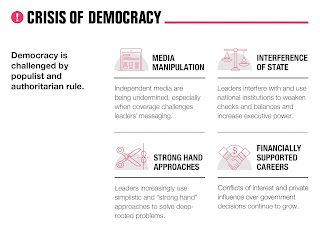 |
| Goodreads book link |
In the aftermath of the 2016 US elections and 2018 Brazil elections -- and especially now, after the 2019 Indian elections and the 2019 Indonesian elections, whose results have, both, just come in, this week -- I think, we should analyse how people ‘really’ elect their leaders.
One of democracy’s salient features, we know, is that people’s mandate is supreme. People’s choice is what matters, and nothing else.
But, perhaps, we should also look at how leaders influence these masses, and sway them, effectively, towards their side, to win at the ballot.
In any democracy, it is the ability to persuade the majority that, if elected, the elected leaders would solve almost all problems, and lead their nations to power and prosperity, that gets the votes.
And within this persuasion is an even more important ability.
It is the ability to convince voters that their political party alone is the best option. And that all other contenders are absolutely unsuitable and completely ineffective.
In fact, they will say, just look at the other contestants’ personal and professional lives. They smack of such low and depraved character that if you really value your nation, you can never vote for them. If you still do vote for them, you are simply not patriotic. You are an anti-national. You have no desire to make your country great again.
Of course, I was only making an attempt at euphemism, to avoid words like mudslinging, slander, defamation and character assassination, which dominate political rhetoric during election time.
While some leaders could be driven by ‘ideologies’, some could be simply driven by ‘populism’. By appealing to the majoritarian cause --- because, there lies the largest vote bank.
More than the charting of a strategic path for the nation, it is the garnering of the largest share of voters that becomes the main focus.
And, I think, that is the biggest problem, facing democracies, today.
Populist leaders speak as if they are the only real voices of ordinary people. They fight against the so-called elite. They tell the majority that the minority is a threat to the majority. Not only to the majority’s well-being but sometimes, even to the majority’s very survival.
Immigrants coming to steal our jobs, minorities taking away our rights and benefits, and even political predecessors, who've wrecked our nation with negligence, greed, and corruption, are all populist announcements that voters will easily buy into.
“What Populists Do to Democracies”, an article I found online, showed me how the rise of ‘populism’ could, in fact, become a threat to the original democratic values (The Atlantic, 26 Dec 2018).
“Right now, the four most populous democracies in the world are ruled by populists: Narendra Modi in India, Donald Trump in the United States, Joko Widodo in Indonesia, and Bolsonaro in Brazil. That makes it rather important to know which scholars are correct: Either democracy is in the midst of an unprecedented global retreat, or we’re witnessing a salutary course correction in which citizens are finally holding global elites to account for their failures”, says the article.
According to its authors, Yascha Mounk, and Jordan Kyle, “populist governments have deepened corruption, eroded individual rights, and inflicted serious damage on democratic institutions”.
Followers of populists could give more credence to passionate nationalism and religious revivalism, than to practical inclusiveness and fact-based scientific truths. They can even distort history and falsify information to suit their narratives.
With government institutions in their pockets, populist leaders could re-write history, re-define culture, refute science, and re-classify society, and go completely against conventional knowledge.
And that, my friends, is the big danger democracies must guard themselves against.
Courtesy : transparency.org
Suggested Readings
- What is populism, and what does the term actually mean? - bbc.com
- How we combed leaders’ speeches to gauge populist rise - The Guardian
- What Populists Do to Democracies - The Atlantic
